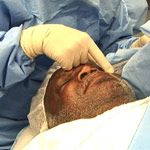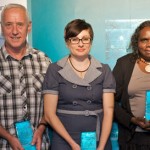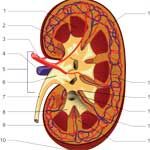
Going to see an optometrist (an eye doctor) can help prevent, heal or reduce damage to your eyesight, but 35 per cent of Indigenous adults have never been to one. Here, Joy McLaughlin, Indigenous Programs Manager for The Fred Hollows Foundation, helps us to ‘see’ why visiting an optometrist is so important.
The Fred Hollows Foundation is an international development organisation that focuses on blindness prevention and Indigenous health. They carry on the work of the late great Professor Fred Hollows who was an eye doctor and passionate about the right for all people to have access to eye health.
“One of the programs we are currently running is an outreach optometry program ,” says Joy. “This involves optometrists going out to remote communities on a regular basis so that people can get their eyes checked.”
However, even when optometrists visit a community, not everybody attends the clinic.
“Unfortunately there’s a view among a lot of our Aboriginal communities that bad eyes is just something that happens to you when you get old, but that’s not necessarily true,” says Joy. “I think people believe that because they haven’t had much exposure to the work that optometrists do, so they don’t know that there are things that you can do to fix poor eyesight or stop it getting worse.”
Not all eye problems will cause blindness and some can be fixed simply with a pair of prescription glasses.
“If you have what they call refractive error – that’s when your sight is not good, either up-close or for distance – this can be very easily corrected with glasses,” says Joy. “Some people have refractive error all their lives, and for others it occurs as you get older. If you find you have to hold your book or newspaper further and further away from your eyes to read it, then that could be because you’re developing long-sightedness so you have trouble reading up-close. That’s common with ageing and we can’t really prevent it, but we can prescribe glasses to help fix the problem.”
The Fred Hollows Foundation also runs an affordable spectacle program to help people purchase glasses if they are needed. However some eye conditions may need more help than just a pair of specs.
“A lot of more serious eye conditions can cause you to become blind,” says Joy, “but the good news is that if you detect these conditions early they can be treated and might not get any worse.”
One of the most common eye conditions in our communities is caused by diabetes, but like diabetes it can be managed and treated.
“One eye disease of particular concern for Aboriginal people is called ‘diabetic retinopathy’,” says Joy. “It causes changes to the blood vessels in the retina in the back of your eye, and if you let it get worse you will lose your sight. But there are a number of things that can be done to stop it progressing – these include surgery with a laser to stop the bleeding in those blood vessels. You also need to manage your diabetes well.”
“Another common disease in Indigenous communities is glaucoma,” says Joy. “This is a disease where pressure builds up inside your eye and slowly destroys your vision, but once again this can be treated if it is detected early. Cataracts are also very common in a lot of older people in Aboriginal communities and these can be removed in a very simple operation in day surgery.”
If you have never visited an optometrist, now is the time to make your first appointment. Many optometrists bulk bill so it won’t cost you anything and if your community doesn’t have a visiting optometrist then talk to your doctor or AMS about where the nearest eye clinic is or look up ‘Optometrists’ in the Yellow Pages.
“For people who don’t have any particular problem with their eyes, it is a good idea to have a check-up every two years or so,” advises Joy. “However if you notice any changes in your vision you should talk to your doctor or optometrist immediately. People with diabetes will need to talk to their doctor about how often they should have their eyes checked and whether they should see an optometrist or if they need to visit a specialist.”
AVOID, PREVENT OR MINIMISE EYE DISEASE
Apart from visiting your optometrist there are some simple things you can do to avoid, prevent or minimise eye disease, according to Joy.
“In general, the things that make your body healthy will keep your eyes healthy as well,” says Joy. “Eating a low-fat diet with plenty of fruit and vegetables is particularly helpful for macular degeneration and diabetic retinopathy. It is also important that you control your diabetes through exercise, eating the right foods and following the instructions of your doctor.”
Other simple things you can do to help protect yourself from eye disease and stay healthy is to limit your alcohol intake and make sure you don’t smoke. Smoking is particularly harmful to your eyes as it can not only damage your blood vessels, but also increase your risk of two particular eye diseases: diabetic retinopathy and macular degeneration.
Hygiene is also important when it comes to eye health, especially for anyone who is at risk of contracting trachoma.
“Trachoma is a disease that’s only found in very specific areas in Australia and as it’s an infection in the eye, the best way to prevent it is to keep a clean face and clean hands. If you have symptoms of trachoma remember it can be treated by your doctor with a simple course of antibiotics.”
Having good sun-sense is also important, not only for preventing skin cancer, but also for anyone at risk of developing cataracts.
“Cataracts aren’t entirely preventable, but you can reduce your risk of developing cataracts by limiting your exposure to ultraviolet light and wearing a hat and sunglasses.”
Unfortunately not all eye diseases are preventable but some, such as glaucoma, can be managed and treated if they are detected early. Once again it is important to remember to visit your optometrist at least every two years.
Not all eye disease however is a result of leading an unhealthy lifestyle, in fact an alarming number of eye problems can actually be caused by accidents, so staying ‘eye aware’ at work and at home can help keep your eyes safe.
“Injury to the eye can result in blindness, so people need to be careful about what they’re doing at work or at home. For example, if they are using tools and drilling or welding they need to make sure they wear protective eyewear and be aware of preventing injuries to their eyes.”






Comments are closed.